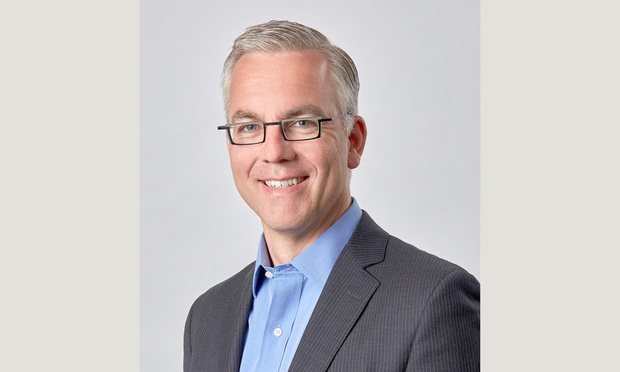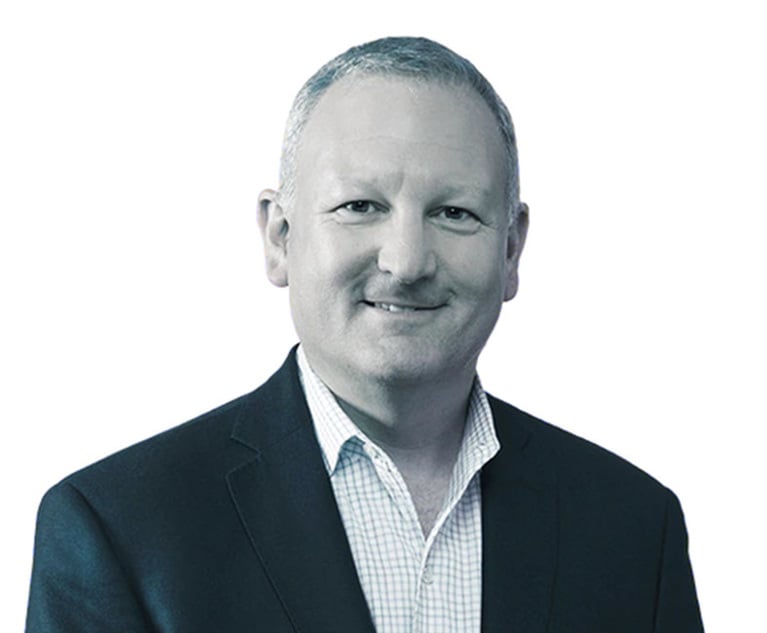Collins Aerospace GC Christoph Feddersen on Recent $30 Billion Merger
Christoph Feddersen has been named vice president and general counsel of Collins Aerospace following United Technologies Corp.'s $30 billion acquisition of avionics maker Rockwell Collins. The deal led to the creation of Collins Aerospace, one of the world's largest aerospace systems makers.
December 11, 2018 at 03:46 PM
4 minute read
 Christoph Feddersen, Collins Aerospace.
Christoph Feddersen, Collins Aerospace.
Christoph T. Feddersen was recently named vice president and general counsel of Collins Aerospace following United Technologies Corp.'s $30 billion acquisition of avionics maker Rockwell Collins. The deal was the biggest in aerospace history and led to the creation of Collins Aerospace, one of the world's largest aerospace systems makers.
“We provide everything from nose to tail” of the plane, Feddersen said in a phone interview Tuesday.
Feddersen, who grew up in Germany, joined United Technologies in 2006 as a Belgium-based assistant general counsel, European legal and regulatory. In 2015, he was promoted to vice president and general counsel for UTC Aerospace Systems in Charlotte, North Carolina. He holds a doctorate in international trade law from the University of Hamburg, Germany as well as a Master of Laws from the University of Michigan Law School and was an Emile Noel Fellow at Harvard Law School. He is admitted to the bars of New York, District of Columbia and Frankfurt am Main, Germany, according to his LinkedIn account.
“U.S. companies tend to be very U.S-centric,” said Feddersen, who is now based in West Palm Beach, Florida. But to be an effective GC of a global company with a stateside headquarters, it's important to have “an interest in other cultures … and be open to different ideas and thoughts that you may not be used to,” he said.
After UTC Aerospace Systems and Rockwell Collins were combined in November, Feddersen was named VP and GC of Collins Aerospace. He and his team had focused on the integration planning phase of the merger, which he described as a “remarkable success story of two companies coming together with similar cultures.”
Feddersen noted that Rockwell Collins' chairman, president and CEO, Kelly Ortberg, became the CEO of Collins Aerospace. And UTC Aerospace Systems' president, Dave Gitlin, transitioned to the role of president and chief operating officer at Collins Aerospace. Gitlin earned a JD from the University of Connecticut School of Law and an MBA from MIT's Sloan School of Management.
“I don't think we really had big challenges,” Feddersen said of the merger. “The good thing was both sides came to an agreement fairly early … and the cultures mesh well. That was probably one of the biggest benefits of this deal.”
But the merger took several months longer than expected to complete, due largely to delays in getting approval from regulators. The U.S. Department of Justice approved the deal Oct. 1, but Connecticut-based UTC waited another five weeks for Chinese regulators to OK the acquisition, Feddersen said.
Asked if the delay in China might have been the result of trade tensions, Feddersen said: “I don't have insight as to why it took longer. But I don't think it was a function of them [Chinese regulators] not liking the deal. There was a clear realization that this is benefiting the marketplace—and you have a big chunk of that [market] in China.”
Feddersen also was involved in UTC's $18.4 billion acquisition of Goodrich Corp. in 2012, which was the largest aerospace merger at the time, he said. In a reverse of what happened during the UTC-Rockwell Collins merger, Chinese regulators approved the Goodrich deal before U.S. regulators, according to Feddersen.
Collins Aerospace has 70,000 employees in 300 locations around the world, and the company is constantly looking to streamline its supply chain out of a desire to stay competitive and lean, Feddersen said. But he did not believe that trade conflicts had provided extra motivation to look outside China for suppliers.
“I'm not sure we would realign our supply chain strategies because of what is hopefully a temporary rift in trade relations,” he said. “If this is a more stationary situation and will prevail for the next 20 years, that is a different story.”
➤➤ Stay on top of in-house developments with Inside Track, a weekly email briefing that breaks down the news, flags key issues and keeps track of who's on the move. Sign up here.
NOT FOR REPRINT
© 2025 ALM Global, LLC, All Rights Reserved. Request academic re-use from www.copyright.com. All other uses, submit a request to [email protected]. For more information visit Asset & Logo Licensing.
You Might Like
View All
Trump Taps McKinsey CLO Pierre Gentin for Commerce Department GC

Upstart Insurer That's Wowing Industry Hires AIG Legal Exec to Help Guide Global Expansion
2 minute read
GOP-Led SEC Tightens Control Over Enforcement Investigations, Lawyers Say

Trending Stories
- 1DeepSeek Isn’t Yet Impacting Legal Tech Development. But That Could Soon Change.
- 2'Landmark' New York Commission Set to Study Overburdened, Under-Resourced Family Courts
- 3Wave of Commercial Real Estate Refinance Could Drown Property Owners
- 4Redeveloping Real Estate After Natural Disasters: Challenges, Strategies and Opportunities
- 5Calif. Fires Should Serve as a Reminder to Fla.’s Commercial Landlords and Tenants Not to Be Complacent
Who Got The Work
J. Brugh Lower of Gibbons has entered an appearance for industrial equipment supplier Devco Corporation in a pending trademark infringement lawsuit. The suit, accusing the defendant of selling knock-off Graco products, was filed Dec. 18 in New Jersey District Court by Rivkin Radler on behalf of Graco Inc. and Graco Minnesota. The case, assigned to U.S. District Judge Zahid N. Quraishi, is 3:24-cv-11294, Graco Inc. et al v. Devco Corporation.
Who Got The Work
Rebecca Maller-Stein and Kent A. Yalowitz of Arnold & Porter Kaye Scholer have entered their appearances for Hanaco Venture Capital and its executives, Lior Prosor and David Frankel, in a pending securities lawsuit. The action, filed on Dec. 24 in New York Southern District Court by Zell, Aron & Co. on behalf of Goldeneye Advisors, accuses the defendants of negligently and fraudulently managing the plaintiff's $1 million investment. The case, assigned to U.S. District Judge Vernon S. Broderick, is 1:24-cv-09918, Goldeneye Advisors, LLC v. Hanaco Venture Capital, Ltd. et al.
Who Got The Work
Attorneys from A&O Shearman has stepped in as defense counsel for Toronto-Dominion Bank and other defendants in a pending securities class action. The suit, filed Dec. 11 in New York Southern District Court by Bleichmar Fonti & Auld, accuses the defendants of concealing the bank's 'pervasive' deficiencies in regards to its compliance with the Bank Secrecy Act and the quality of its anti-money laundering controls. The case, assigned to U.S. District Judge Arun Subramanian, is 1:24-cv-09445, Gonzalez v. The Toronto-Dominion Bank et al.
Who Got The Work
Crown Castle International, a Pennsylvania company providing shared communications infrastructure, has turned to Luke D. Wolf of Gordon Rees Scully Mansukhani to fend off a pending breach-of-contract lawsuit. The court action, filed Nov. 25 in Michigan Eastern District Court by Hooper Hathaway PC on behalf of The Town Residences LLC, accuses Crown Castle of failing to transfer approximately $30,000 in utility payments from T-Mobile in breach of a roof-top lease and assignment agreement. The case, assigned to U.S. District Judge Susan K. Declercq, is 2:24-cv-13131, The Town Residences LLC v. T-Mobile US, Inc. et al.
Who Got The Work
Wilfred P. Coronato and Daniel M. Schwartz of McCarter & English have stepped in as defense counsel to Electrolux Home Products Inc. in a pending product liability lawsuit. The court action, filed Nov. 26 in New York Eastern District Court by Poulos Lopiccolo PC and Nagel Rice LLP on behalf of David Stern, alleges that the defendant's refrigerators’ drawers and shelving repeatedly break and fall apart within months after purchase. The case, assigned to U.S. District Judge Joan M. Azrack, is 2:24-cv-08204, Stern v. Electrolux Home Products, Inc.
Featured Firms
Law Offices of Gary Martin Hays & Associates, P.C.
(470) 294-1674
Law Offices of Mark E. Salomone
(857) 444-6468
Smith & Hassler
(713) 739-1250






